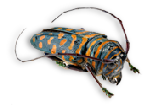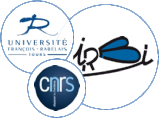





Keywords :
Integrative biology
Organismal biology
Functional ecology
Quantitative ecology
Population dynamics
Community dynamics
Climate change biology
Nature inspired technology
Agroecology-Agroforestry
Arthropod biology
Multitrophic interactions
Ecomechanics

I had so far good students who got interesting jobs in different countries; most of them hold permanent positions within the academia [click here to alumni]. I am also particularly proud of having two Ph.D. students winning the prizes for the best paper written by a junior scientist in two journals of the British Ecological Society, Functional Ecology in 2002 (D. Giron) and Journal of Animal Ecology in 2007 (S. Pincebourde). This is most likely unique in the long history of that society.
My masters students know rather well what they want, and even better what they dislike.
I help them a lot in identifying he best groups worldwide to carry on with their
aims, such as for the two master students C. Boutry (now with T. Blackedge, Akron
University, to study spider web mechanics) and R. Richard (now with E. McCauley,
Calgary, to study the link between individual physiology and population dynamics
in Daphnia). For those who carry on with a Ph.D. with me, I borrow a strategy from
one of my former advisors, R. Nisbet. He defines the Ph.D. thesis in three successive
time blocks, the first one being directed by the professor (remember the word ‘student’
after ‘Ph.D.’), the second block being one of consensus if not conflict, as students
acquired self-
Of course all this can be achieved only if there is a full commitment to the task,
implying weeks of many work hours, sometimes reduced week-
Many good students are running away from Science. Among the many reasons, the lack of job perspective is often quoted as a major stumbling block. It does not fit my own personal experience. It is true that there are more and more scientists on the market (but when you follow this really as closely as you say, you know that the number of wanted scientists in the EU or India, for example, in the coming decade is huge). It is however also true that the world will always lack people of good will who do more than going after their ‘business as usual’.
If you feel interested by coming to work in our group, or to visit us, please feel
free to email me (jerome.casas@univ-

Institut de Recherche sur la Biologie de l'Insecte
UMR 7261 Faculté des Sciences et Techniques
Avenue Monge, Parc Grandmont
37200 TOURS (France)
